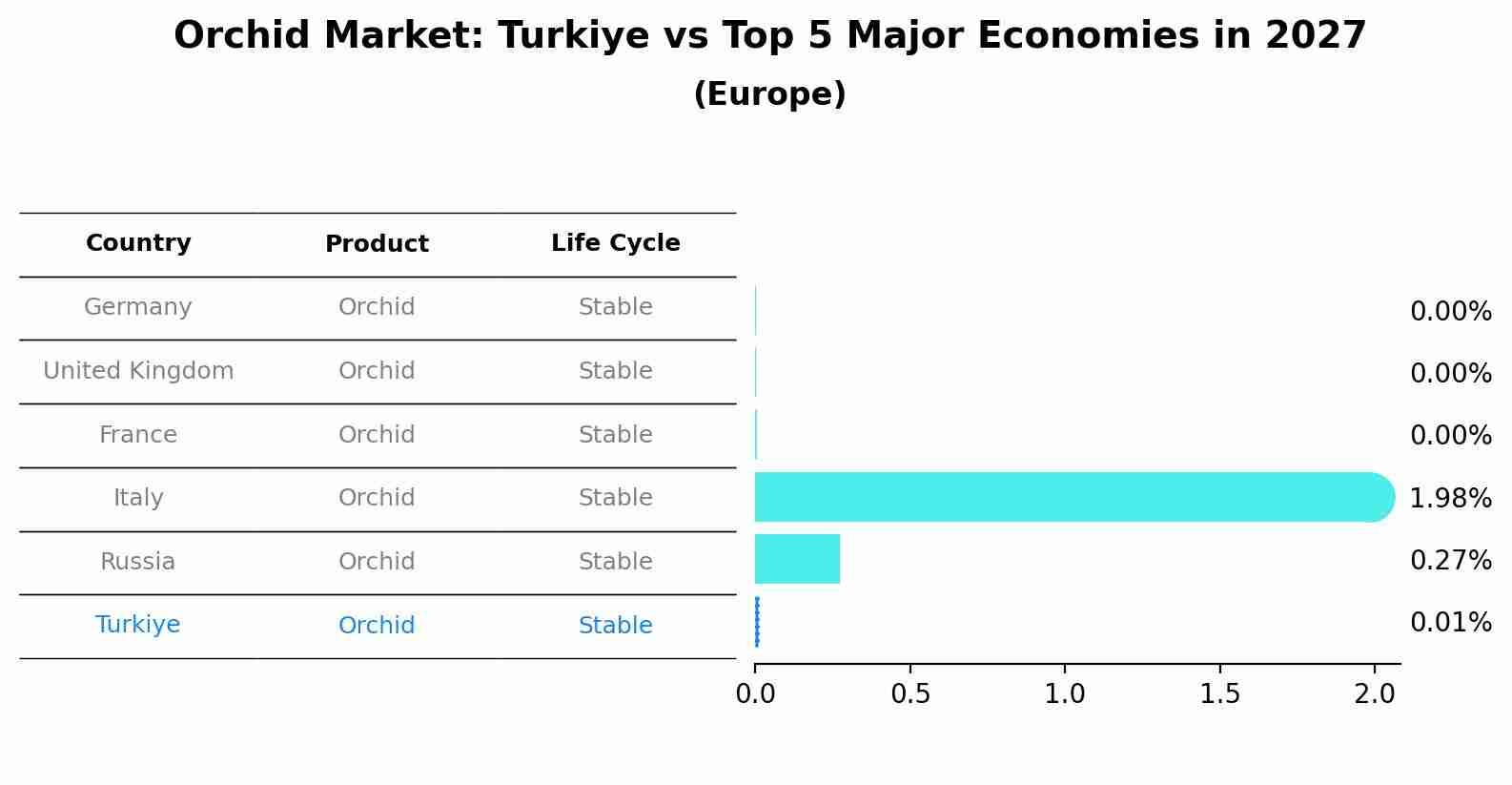Turkey Orchid Market (2025-2031) Outlook | Companies, Forecast, Size, Revenue, Analysis, Trends, Growth, Value, Industry, Share
| Product Code: ETC383438 | Publication Date: Aug 2022 | Updated Date: Jul 2025 | Product Type: Market Research Report | |
| Publisher: 6Wresearch | Author: Dhaval Chaurasia | No. of Pages: 75 | No. of Figures: 35 | No. of Tables: 20 |
Turkiye Orchid Market Size Growth Rate
The Turkiye Orchid Market is projected to witness mixed growth rate patterns during 2025 to 2029. Starting high at 0.01% in 2025, the market steadily declines to 0.01% by 2029.

Orchid Market: Turkiye vs Top 5 Major Economies in 2027 (Europe)
The Orchid market in Turkiye is projected to grow at a stable growth rate of 0.01% by 2027, highlighting the country's increasing focus on advanced technologies within the Europe region, where Germany holds the dominant position, followed closely by United Kingdom, France, Italy and Russia, shaping overall regional demand.

Turkey Orchid Market Synopsis
The Turkey Orchid Market is currently experiencing growth due to increasing popularity of orchids as household plants for decoration and gifting purposes. Consumers are drawn to the wide variety of orchid species available, ranging from Phalaenopsis to Cymbidium, which offer different colors, shapes, and sizes to choose from. The market is driven by factors such as rising disposable income, urbanization, and growing interest in indoor gardening. Retail channels like florists, garden centers, and online platforms play a significant role in distributing orchids to consumers. Additionally, events like weddings and corporate functions further boost demand for orchids as decorative elements. However, challenges in terms of maintaining orchid health and ensuring proper care remain, leading to opportunities for education and specialized services within the market.
Turkey Orchid Market Trends
The Turkey Orchid Market is experiencing a rise in demand for locally grown and sustainable orchids, reflecting a growing preference for environmentally friendly products among consumers. There is also an increasing interest in unique and exotic orchid varieties, driving a trend towards collecting rare species. Online sales of orchids have seen a notable increase, with more consumers turning to e-commerce platforms for convenient purchasing options. Additionally, there is a growing awareness of the health benefits of orchids, leading to a surge in demand for orchid-based products such as essential oils and skincare items. Overall, the Turkey Orchid Market is evolving to cater to changing consumer preferences for sustainability, uniqueness, convenience, and wellness benefits.
Turkey Orchid Market Challenges
The Turkey Orchid market faces several challenges, including competition from lower-cost imports, changing consumer preferences, and limited availability of suitable growing conditions. Imported orchids from countries with lower production costs can undercut local prices, making it difficult for Turkish growers to compete. Additionally, consumer preferences are shifting towards more exotic or unique orchid varieties, which may not be easily cultivated in Turkey. The country`s climate may also pose challenges for orchid cultivation, as these flowers typically require specific temperature and humidity conditions. Overall, Turkish orchid growers need to adapt to these challenges by diversifying their product offerings, improving quality, and exploring innovative cultivation techniques to remain competitive in the market.
Turkey Orchid Market Investment Opportunities
The Turkey orchid market presents various investment opportunities for individuals and businesses looking to capitalize on the growing demand for ornamental plants. With a flourishing interest in indoor gardening and home decor, the demand for orchids as decorative plants has been steadily increasing. Investing in orchid cultivation and distribution can be a lucrative venture, especially considering the diverse range of orchid species and colors available in the market. Additionally, the rise of e-commerce platforms and online marketplaces provides a convenient avenue for selling orchids to a broader audience both domestically and internationally. Furthermore, there is potential for establishing orchid nurseries, organizing orchid exhibitions, or offering specialized orchid care services to cater to the growing market of plant enthusiasts in Turkey.
Jordan Agar Market Government Policies
The Turkish government does not have specific policies targeted at the orchid market. However, the country has regulations in place to protect native orchid species from illegal harvesting and trade. Turkey is a signatory to international agreements such as the Convention on International Trade in Endangered Species of Wild Fauna and Flora (CITES), which restrict the cross-border trade of endangered orchid species. Additionally, the General Directorate of Nature Conservation and National Parks under the Ministry of Environment and Urbanization oversees the protection of flora and fauna, including orchids, through conservation programs and enforcement of laws against illegal collection and trade. Overall, while there are no direct policies for the orchid market, the government`s focus on conservation and protection of native species indirectly impacts orchid trade in Turkey.
Turkey Orchid Market Future Outlook
The future outlook for the Turkey Orchid Market appears promising as demand for orchids continues to rise due to their aesthetic appeal and growing popularity as gifts or decorative items. With increasing disposable income and a trend towards interior decoration and gifting culture in Turkey, the market is expected to witness steady growth in the coming years. Additionally, advancements in greenhouse technology and cultivation techniques are likely to boost production efficiency and expand the variety of orchids available in the market, appealing to a wider range of consumers. However, factors such as changing consumer preferences, competition from alternative gifting options, and potential environmental challenges could impact the market dynamics. Overall, the Turkey Orchid Market is poised for growth, driven by evolving consumer trends and technological innovations.
Key Highlights of the Report:
- Turkey Orchid Market Outlook
- Market Size of Turkey Orchid Market, 2024
- Forecast of Turkey Orchid Market, 2031
- Historical Data and Forecast of Turkey Orchid Revenues & Volume for the Period 2021 - 2031
- Turkey Orchid Market Trend Evolution
- Turkey Orchid Market Drivers and Challenges
- Turkey Orchid Price Trends
- Turkey Orchid Porter's Five Forces
- Turkey Orchid Industry Life Cycle
- Historical Data and Forecast of Turkey Orchid Market Revenues & Volume By Product Type for the Period 2021 - 2031
- Historical Data and Forecast of Turkey Orchid Market Revenues & Volume By Phalaenopsis Orchid for the Period 2021 - 2031
- Historical Data and Forecast of Turkey Orchid Market Revenues & Volume By Cattleya Orchid for the Period 2021 - 2031
- Historical Data and Forecast of Turkey Orchid Market Revenues & Volume By Vanda Orchid for the Period 2021 - 2031
- Historical Data and Forecast of Turkey Orchid Market Revenues & Volume By Paphiopedilum Orchid for the Period 2021 - 2031
- Historical Data and Forecast of Turkey Orchid Market Revenues & Volume By Miltonia Orchid for the Period 2021 - 2031
- Historical Data and Forecast of Turkey Orchid Market Revenues & Volume By Others for the Period 2021 - 2031
- Historical Data and Forecast of Turkey Orchid Market Revenues & Volume By Application for the Period 2021 - 2031
- Historical Data and Forecast of Turkey Orchid Market Revenues & Volume By Garden for the Period 2021 - 2031
- Historical Data and Forecast of Turkey Orchid Market Revenues & Volume By Cosmetic for the Period 2021 - 2031
- Historical Data and Forecast of Turkey Orchid Market Revenues & Volume By Herbal Medicine for the Period 2021 - 2031
- Turkey Orchid Import Export Trade Statistics
- Market Opportunity Assessment By Product Type
- Market Opportunity Assessment By Application
- Turkey Orchid Top Companies Market Share
- Turkey Orchid Competitive Benchmarking By Technical and Operational Parameters
- Turkey Orchid Company Profiles
- Turkey Orchid Key Strategic Recommendations
Frequently Asked Questions About the Market Study (FAQs):
- Single User License$ 1,995
- Department License$ 2,400
- Site License$ 3,120
- Global License$ 3,795
Search
Thought Leadership and Analyst Meet
Our Clients
Related Reports
- Afghanistan Rocking Chairs And Adirondack Chairs Market (2026-2032) | Size & Revenue, Competitive Landscape, Share, Segmentation, Industry, Value, Outlook, Analysis, Trends, Growth, Forecast, Companies
- Afghanistan Apparel Market (2026-2032) | Growth, Outlook, Industry, Segmentation, Forecast, Size, Companies, Trends, Value, Share, Analysis & Revenue
- Canada Oil and Gas Market (2026-2032) | Share, Segmentation, Value, Industry, Trends, Forecast, Analysis, Size & Revenue, Growth, Competitive Landscape, Outlook, Companies
- Germany Breakfast Food Market (2026-2032) | Industry, Share, Growth, Size, Companies, Value, Analysis, Revenue, Trends, Forecast & Outlook
- Australia Briquette Market (2025-2031) | Growth, Size, Revenue, Forecast, Analysis, Trends, Value, Share, Industry & Companies
- Vietnam System Integrator Market (2025-2031) | Size, Companies, Analysis, Industry, Value, Forecast, Growth, Trends, Revenue & Share
- ASEAN and Thailand Brain Health Supplements Market (2025-2031) | Strategy, Consumer Insights, Analysis, Investment Trends, Opportunities, Growth, Size, Share, Industry, Revenue, Segments, Value, Segmentation, Supply, Forecast, Restraints, Outlook, Competition, Drivers, Trends, Demand, Pricing Analysis, Competitive, Strategic Insights, Companies, Challenges
- ASEAN Bearings Market (2025-2031) | Strategy, Consumer Insights, Analysis, Investment Trends, Opportunities, Growth, Size, Share, Industry, Revenue, Segments, Value, Segmentation, Supply, Forecast, Restraints, Outlook, Competition, Drivers, Trends, Demand, Pricing Analysis, Competitive, Strategic Insights, Companies, Challenges
- Europe Flooring Market (2025-2031) | Outlook, Share, Industry, Trends, Forecast, Companies, Revenue, Size, Analysis, Growth & Value
- Saudi Arabia Manlift Market (2025-2031) | Outlook, Size, Growth, Trends, Companies, Industry, Revenue, Value, Share, Forecast & Analysis
Industry Events and Analyst Meet
Whitepaper
- Middle East & Africa Commercial Security Market Click here to view more.
- Middle East & Africa Fire Safety Systems & Equipment Market Click here to view more.
- GCC Drone Market Click here to view more.
- Middle East Lighting Fixture Market Click here to view more.
- GCC Physical & Perimeter Security Market Click here to view more.
6WResearch In News
- Doha a strategic location for EV manufacturing hub: IPA Qatar
- Demand for luxury TVs surging in the GCC, says Samsung
- Empowering Growth: The Thriving Journey of Bangladesh’s Cable Industry
- Demand for luxury TVs surging in the GCC, says Samsung
- Video call with a traditional healer? Once unthinkable, it’s now common in South Africa
- Intelligent Buildings To Smooth GCC’s Path To Net Zero


















